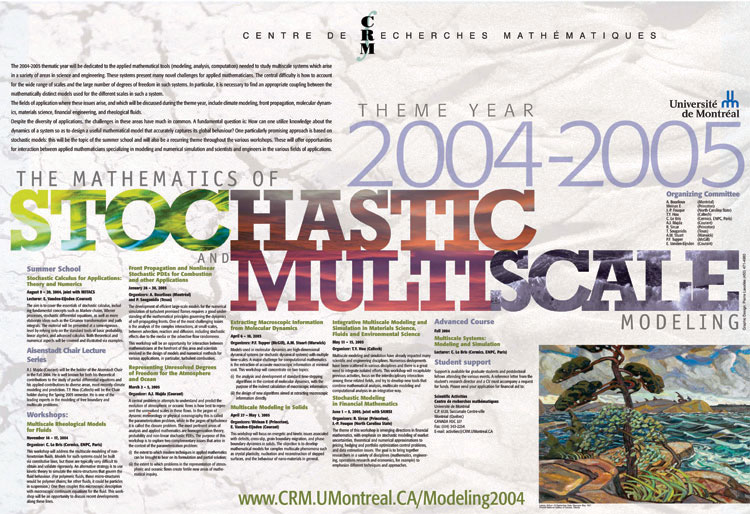 Arthur Lismer - A September Gale Georgian Bay, 1921
Arthur Lismer - A September Gale Georgian Bay, 1921
Photo National Gallery of Canada, Ottawa
|
Organizers
> A. Bourlioux (Montréal)
> Weinan E (Princeton)
> J.-P. Fouque (North Carolina State)
> T.Y. Hou (Caltech)
> C. Le Bris (Cermics, ENPC, Paris)
>A.J. Majda (Courant)
> R. Sircar (Princeton)
> T. Souganidis (Texas)
> A.M. Stuart (Warwick)
> P.F. Tupper (McGill)
> E. Vanden-Eijnden (Courant).
|
|
Overview
The 2004-2005 thematic year will be dedicated to the applied mathematical tools (modeling, analysis, computation) needed to study multiscale systems which arise in a variety of areas in science and engineering. These systems present many novel challenges for applied mathematicians. The central difficulty is how to account for the wide range of scales and the large number of degrees of freedom in such systems. In particular, it is necessary to find an appropriate coupling between the mathematically distinct models used for the different scales in such a system.
The fields of application where these issues arise, and which will be discussed during the theme year, include climate modeling, front propagation, molecular dynamics, materials science, financial engineering, and rheological fluids.
Despite the diversity of applications, the challenges in these areas have much in common. A fundamental question is: How can one utilize knowledge about the dynamics of a system so as to design a useful mathematical model that accurately captures its global behaviour? One particularly promising approach is based on stochastic models: this will be the topic of the summer school and will also be a recurring theme throughout the various workshops. These will offer opportunities for interaction between applied mathematicians specializing in modeling and numerical simulation and scientists and engineers in the various fields of applications.
|
